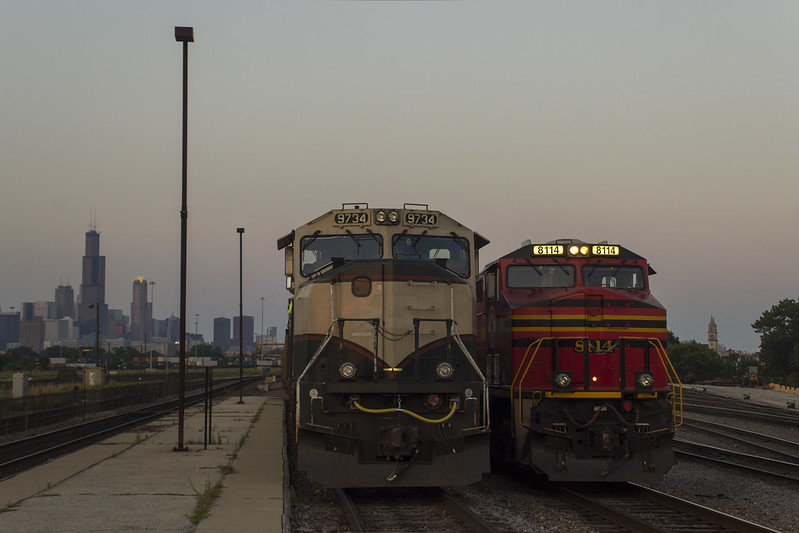Which railroad positions offer the highest salaries?
The railroad sector offers a wide range of exciting career options that may have many advantages. You can decide what abilities you already have and what you’ll need for these transportation jobs by learning about the jobs you can do on a train and the advantages of working for the railway industry.
We discuss the main justifications for working on a train in this article, as well as a number of train-related jobs. Please read on…
Table of Contents
Best Paying Jobs In Railroads
Rail Track Maintainer
Salary on a national average: $114,000 per year
It is one of the best paying jobs in the railroads. This wide range of salary potential suggests that, depending on skill level, location, and years of experience, there may be numerous opportunities for advancement and increased pay. The United States job market for rail track maintainers is moderately active, with a few companies hiring, according to recent job postings on ZipRecruiter.
Locomotive Operator
Average salary in the country: $104,000 per year
It is your responsibility as a locomotive operator to ensure the smooth operation of a railcar facility by operating engines or switching vehicles between tracks as necessary. Providing briefings and explanations of the tracks, applying regulations and special instructions, conducting inspections, loading and unloading trains from tracks, and producing daily reports for each railcar whose activities you are logging are among your additional duties. You might be required to be able to switch between operating a train as a conductor and working in the control booth by some employers, so you should be familiar with safe train engine operation and procedures.
Track Inspector
Average salary in the nation:$105,500 per year
To ensure that the tracks are secure enough for trains to use, a track inspector inspects railroad tracks. A track inspector’s duties include keeping thorough records about the state of railroad tracks and submitting maintenance requests as required so that train engineers, railroad employees, and passengers can travel on the tracks safely. Driving high-rail trucks on railroad right-of-ways, keeping an eye on how crossing and signal equipment is working, and creating reports are some additional job responsibilities. The Federal Railroad Administration’s (FRA) certification may be one of the requirements you must meet to become a track inspector.
Switch Technician
Average salary across the country: $86,500 per year
The installation, maintenance, and repair of wireless telecommunications equipment are the main duties of a switch technician. You have a responsibility as a switch technician to test, identify, and fix equipment issues quietly. Additionally, you maintain computer hardware and software as well as equipment and backup databases. To meet deadlines for a new installation, maintenance, or repair, you work directly with telecommunications vendors and customers. You keep written reports and records on a daily log along with an equipment inventory. It is also one of the best paying jobs in the railroads.
Depot Manager
Average salary in the country:$73,000 per year
For a particular company, a depot manager is in charge of overseeing a depot location. This depot can serve as a collection site for a wide range of goods and materials, including fuels and scrap metal. Your job responsibilities include managing the depot’s daily operations, hitting set profit goals, and ensuring that all safety regulations are adhered to. You work with clients and deal with customers in this line of work. A high school diploma is a requirement for a career as a depot manager. A bachelor’s degree in management might be preferred by some employers, though.
Railroad Engineer
Average salary in the country:$69,500 per year
Trains are driven by railroad engineers along routes to deliver people or goods to various locations. It is one of the best paying jobs in the railroads. Your responsibilities as a locomotive engineer include managing the train’s speed to take into account the weather and the track’s conditions, keeping an eye on controls and equipment, keeping track of train inspections, speaking with other railroad workers face-to-face and over the radio, managing time to keep trains on schedule, and responding appropriately to emergency situations. You must possess the capacity for rational thought and prompt judgment. For employment as a railroad engineer, you should have excellent time management and communication skills.
Locomotive Electrician
Average salary in the country:$66,000 per year
Installing, maintaining, and repairing crucial electrical systems on a train locomotive are your duties as a locomotive electrician. Locomotive electricians typically work in repair and maintenance for railroad freight or passenger companies, performing regular inspections of all the significant electrical parts of a train, such as the motor, circuit systems, battery, and fuse system. You order replacement parts for trains and keep daily logs of safety and maintenance inspections in addition to your repair and maintenance responsibilities. It is one of the best paying jobs in the railroads.
Locomotive Mechanic
average salary in the nation:$53,000 per year
Train equipment and engines are maintained and fixed by a locomotive mechanic. In this line of work, you’re employed by a railroad company and your responsibilities typically center around diesel-powered locomotives. You operate large machinery, such as hydraulic lifts, mechanical drills, and lathes, during repairs and maintenance. You frequently work in a train yard or station, but part of your job involves traveling to a far-off location to fix a train that has broken down on the tracks. A student in a technical or vocational program becomes an entry-level locomotive mechanic. You work as an apprentice or assistant while you develop the skills you need to be an independent worker.
Track Worker
Salary on a national average: $31,000-$51,000 per year
A crew member who installs, maintains, and repairs railroad tracks and machinery is known as a track worker. As a track worker, your job responsibilities include replacing broken track parts with new bars, rails, or ties, aligning tie plates and rail bolts, lubricating switches, and clearing vegetation out of the right-of-way. This job requires you to adhere to safety regulations and instructions. You must have a high school diploma or a GED, a current driver’s license, and strong communication abilities to work as a track worker. Additionally, you must be over 18 and have previous manual labor experience.
Signal Apprentice
average salary in the country: $33,000-$49,500 per year
An employee of a rail company, a signal apprentice gains practical experience and training while learning the responsibilities of a signal maintainer. As part of your training, you will work on a railroad to help an experienced signal maintainer install, fix, check, and test signal equipment. As you pass train crossings while driving along a railroad, you evaluate each signal and piece of safety hardware. You must comprehend these safety systems and know how to install and fix them in order to perform your job duties. You acquire the knowledge and abilities necessary to perform your duties as a signal apprentice, particularly those that are related to wiring the machinery.
Train Engineers
Salary on a national average: $65,444 per year.
A train engineer’s main responsibilities include directing the movement of trains. Train engineers can interpret radio transmissions from the dispatcher and keep an eye on the weather to modify their routes as necessary.
Engineers of freight trains can adjust their drive to take into account various freight types and weights. It is one of the best paying jobs in the railroads.
Conductor
Average salary across the country: $76,404 per year
In order to maintain passenger safety and train schedules, a conductor’s primary responsibilities are to supervise the actions of the train’s crew. On rail lines, they can take tickets and inform passengers of a train’s scheduled stops.
As a result, they can guarantee cargo loading and unloading on freight trains before a train departs. The staff and passengers of a train can be held accountable for following corporate and governmental train safety regulations by the conductor.

Utility Clerk
Salary on a national average: $25,938 per year
A utility clerk’s main responsibilities in the rail sector are to ensure the secure movement of rail cars in rail yards. Utility clerks can also carry out clerical tasks to make sure a company’s trains run smoothly.
In order to maintain the cleanliness of the workspaces at a train station, a utility clerk may also perform cleaning tasks.
Track Laborer
average salary in the nation: $38,000 per year
Track laborers’ main responsibilities include inspecting, maintaining, and repairing rail lines as well as some training equipment for passenger and freight railroad companies.
Additionally, this is physically demanding work that requires a lot of stamina and strength. Track laborers cover a lot of ground while working outside.
Rail Car Loader
average salary in the nation: $40,000 per year
The main responsibilities of rail car loaders are to work for private companies that transport goods by rail. For transportation out of warehouses and distribution centers, rail car loaders oversee the loading and securing of goods into the cars.
Additionally, they unload freshly delivered goods. To make sure that goods are delivered on time, they collaborate with railroad companies. Forklifts and other warehousing equipment must be understood in order to perform this job.
Yardmaster
Average salary across the country:$48,000 per year
The duties of a yardmaster include managing a specific rail yard and monitoring all of the railroads in the territory that is assigned to you. You’re responsible for making sure each rail car is attached to the appropriate vehicle, that trains travel in a way that keeps traffic flowing, and that your facility’s daily operations run smoothly. Trains in a yardmaster’s domain can be ordered to report to a particular location when necessary, and they have a lot of control over the movement of other trains in the yard. You also oversee repairs made by other workers at your company. Management abilities are essential because this is primarily a supervisory position.
Utility Clerk
average salary in the nation: $25,938 per year
During the safe transportation of rail cars in rail yards, a utility clerk helps the rail industry. They are able to place orders for supplies like train parts. To ensure that a company’s trains run smoothly, utility clerks can also carry out clerical tasks. To maintain the cleanliness of the working areas in a train station, a utility clerk may also perform cleaning tasks. It is one of the best paying jobs in the railroads.
Signal Engineer
average salary in the nation:$150,000 per year
Most Signal Engineers in the US earn an annual salary between $80,500 (25th percentile) and $160,000 (75th percentile), which is the range of salaries for this profession. This wide range of salary potential suggests that, depending on skill level, location, and years of experience, there may be numerous opportunities for advancement and increased pay. According to recent job postings on ZipRecruiter, there are a lot of companies hiring for Signal Engineers in the United States.
Signal Integrity Engineer
Salary on a national average: $135,500 per year
Within electronics engineering, a signal integrity engineer works. Circuit boards and electrical systems are designed by you. You have a responsibility to solve issues with electrical current delivery in various devices. Making circuitry’s current flow through paths is another responsibility. In order to deliver the highest quality current to a device or piece of equipment, signal integrity engineers strive to keep current free from interference and reflections. You locate design issues and create fixes using your exceptional troubleshooting abilities.
Signal Inspector
average salary in the nation: $115,500 per year
Currently, the average salary for a signal inspector in the US is $49,000 (25th percentile), with the 75th percentile earning $135,500 annually. This wide range of salary potential suggests that, depending on skill level, location, and years of experience, there may be numerous opportunities for advancement and increased pay. According to recent job postings on ZipRecruiter, there are a few companies hiring for Signal Inspector positions in the United States.
Signal Processing Engineer
average salary in the nation:$115,000 per year
A signal processing engineer is a specialist in information technology who examines and modifies digital signals to increase their accuracy and dependability. Develop, manage, and update digital signals as a signal processing engineer, and create algorithms to process them more quickly. A bachelor’s degree in electrical or computer engineering, math, or physics is required for the position of signal processing engineer, as well as proficiency in a number of programming languages, including C++. Jobs for signal processing engineers are available in many different sectors, including security and logistics.

Train Dispatcher
Salary on a national average: $32,178 per year
To ensure the security of a train’s passengers and cargo, a train dispatcher plans the movement of trains in accordance with schedules. They can talk with train engineers about a train’s schedule and any weather changes that might affect it. To keep freight trains on schedule, train dispatchers can also manage the resources of a rail yard.
Train Yard Manager
Average salary across the country: $36,878 per year
A rail yard’s operations are overseen by a train yard manager, also known as a yardmaster. They can delegate tasks such as putting railcars on the tracks, conducting inspections, fixing railcars, and studying train schedules to workers in the rail yard. A freight train’s cargo can be tracked and managed by the railroad yard manager to make sure it gets to its intended location. It is one of the best paying jobs in the railroads.
Welder
average salary in the nation: $37,398 per year
In order to maintain safe and effective train travel, a welder can work for a railroad company to maintain and repair railroad tracks. They can fix the railbed and drive railroad spikes with the aid of equipment. For the benefit of railroad companies, welders can also check railroad tracks for damage or flaws to ensure and maintain their quality.
Signal Maintainer
average salary in the country: $50,190 per year
To keep the railroad’s signaling apparatus in good working order, a signal maintainer performs maintenance duties. To assist businesses in abiding by signaling laws, they can adhere to government regulations for railroad signals. Signal maintainers can check equipment on a regular basis to make sure it keeps working. To fix equipment problems after hours, these railroad workers may put in extra time.
Diesel Mechanic
average salary in the nation: $48,402 per year
Inspecting, maintaining, and fixing diesel locomotive trains are tasks that a diesel mechanic performs. By doing so, they can ensure that trains adhere to the company’s and the government’s safety standards for passengers and cargo.
Diesel mechanics can make use of forklifts and other large machinery to carry out their job duties. Using their knowledge of the mechanical components of the locomotive, diesel mechanics can also identify issues with a train’s operations.
Signal Maintainer
average salary in the country: $50,190 per year
A signal maintainer keeps the signaling apparatus on a railroad in good working condition.
By following the rules set forth by the government for railroad signals, they can help businesses comply with signaling regulations.
In order to ensure that the equipment keeps functioning, signal maintainers can also perform routine tests on it.
Carman
Average salary across the country: $61,292
A railroad mechanic with a focus on freight car upkeep is known as a “carman.” Because of their knowledge of the rail industry and government safety guidelines, they can analyze railcars.
Carmen’s technical abilities can be used to handle repairs and maintenance on train equipment. A carman can check the air brakes on a railcar to make sure they are working properly. It is one of the best paying jobs in the railroads.
Switchman
average salary in the nation: $37,500 per year
At railroad intersections, a switchman’s responsibility is to operate the switches that change the direction of the trains. Modern switches are operated by hydraulic systems and computers.
Switchmen, engineers, and train dispatchers collaborate to make sure that trains travel through junctions safely and on the proper track. Fast thinking and the ability to function under pressure are both caused by this position.
Brake Operator
Salary on a national average: $37,500
Railway brakes, which are primarily airbrakes, are the responsibility of brake operators, also referred to as brakemen.
However, they are frequently referred to as conductor and engineer helpers. They could solicit tickets at stations or make announcements to train passengers.
Crew Member
Average salary across the country: $ 24,149 per year
The primary responsibilities of a train crew member are to ensure the security and comfort of rail passengers. In addition to helping a conductor with safety assurance responsibilities, they can respond to inquiries from passengers.
Cook In Railroads Jobs
average salary in the nation: $25,606 per year
On a passenger train, a cook’s main responsibilities are to prepare meals as requested by the passengers. Along with other meal preparation tasks, they can wash, peel, and slice fruits and vegetables. The work of other staff members in a train’s kitchen can also be managed by the cook.
A train cook can also make sure that the train’s food supply is sufficient for the number of passengers and the length of the journey.
Read about: Low-stress Jobs That Pay Well Without A Degree?
What Exactly Are Railroad Jobs?
These are positions that revolve around the movement of people and goods by trains. It guarantees safe and timely operation of both passenger and freight trains.
Railroad Classes
Our classification of railroads is as follows:
1. The highest paying railroad jobs are available in Class 1, which is the class of railroads. The business must, however, generate at least $433.2 million in revenue in order to be recognized as a Class 1 railroad.
In the United States, there are eight class 1 railroads. However, due to the significant financial investment required, Class 1 is the best railroad industry to work for.
- AmTrak
- BNSF Railway
- Canadian National Railway
- Canadian Pacific Railway
- CSX Transportation
- Kansas City Southern Railway
- Norfolk Southern Railway
- Union Pacific Railway
2. Class 11: These are regional railroads
3. Short lines and terminal railroads are classified as Class 111.

Why Work On Railroad?
Here are a few benefits of working for a railroads company
- Travel: You can travel the country for business purposes while working on a train.
- Benefits: Along with a competitive salary, rail transportation employees also have access to a variety of health and vacation benefits.
- Prospects for training You can acquire the skills necessary for a career in the railroad industry by taking advantage of the extensive on-the-job training that is provided by many of these jobs.
- Unions: The employees are represented in pay and benefit negotiations by associations or unions that are affiliated with numerous railroad companies. A union can also represent workers’ interests and perhaps even help them receive better benefits.
Pursuing A Career In Railroads
Many railroads have stepped up their efforts to hire and retain employees in recent years. Some of these new initiatives are intended to help employees while they are still working for the railroad, while others are intended to help them after they retire.
Paid time off and retirement plans are just a couple of the advantages that railroad employees enjoy. In order to encourage employees to work for the same company for an extended period of time, many railroads also provide a job guarantee program. Additionally, railroad employees might be able to sign up for retirement or health insurance programs that are unavailable in other sectors of the economy.
Jobs in the railroad industry frequently pay more than many other jobs, making them the best choice for those looking to increase their income. A railroad worker typically earns more money per hour than other types of workers, which makes it simpler for them to pay for basic expenses and put money aside for retirement.
Because it enables them to explore the nation at their own pace, working for the railroad is a profession that many people enjoy. These people may find it simpler to visit friends and family and escape from their regular lives as a result. It is simpler for railroad workers to spend time with family members when they need to relax or take a break because their schedules are frequently flexible.
Read about: Can You Lose A Job Offer By Negotiating Salary
Is A Career In The Rail Industry Profitable?
Statista estimates that there were more than 135,000 workers employed in the railroad sector in 2020. With salaries ranging from $50,000 to more than $150,000 annually, the majority of these workers are paid very well for their work. One of the most appealing aspects of working in this sector is the competitive pay.
In addition, a lot of railroad workers appreciate the amount of travel that comes with their line of work. Every day you go to work if you work on a cross-country passenger train, you will get to travel to new places. But keep in mind that trains run 365 days a year, every day of the week. It’s possible that you will have to work nights, weekends, and holidays frequently because of this.
While spending days or weeks away from home at a time is a requirement of the job, unions provide protection for the majority of railroad workers. By establishing mandatory rest periods for all workers, you can be sure to receive vacation benefits in addition to health insurance and retirement plans.
In order to give you the skills you’ll need to perform your job well, the majority of railroad companies will also offer extensive training programs before hiring you. There’s no need to worry about specifics because of this; even though you will still need to show that you understand some skills at a fundamental level for most positions.
In general, people think that working in the railroad sector is a fantastic job with tons of benefits. Very few drawbacks exist if you can handle the extended absences from home.
Important Skills For Railroad Workers
For railroad workers to succeed in their jobs, they need a wide range of technical skills. There are some skills that all railroad workers should possess, regardless of their position on the team, even though the hard skills, or “teachable” skills, you’ll need will vary depending on your particular job description. These include:
- Leadership
- Customer service
- Attention to detail
- Quick decision making
- Hand-eye coordination
- Mechanical knowledge
- Effective communication
Leadership Skills
Many of the highest-paying railroad jobs entail managing or supervising other railroad employees or train crew members. You therefore require a certain degree of leadership abilities. These may include:
- Scheduling employees for shifts
- Assigning tasks to crew members
- Asking railroad workers for information regarding tracks and signals
- Enforcing both company and government-regulated safety protocols
Possessing the necessary abilities to lead a team effectively is essential if you want to work in some of the highest paying positions on the railroad.
Customer Service
While conductors will be the members of a train’s crew with whom passengers will interact most frequently, it’s crucial for all the highest paid railroad employees to have excellent customer service skills. You’re likely to interact with a number of people during your shifts, whether you’re working on a passenger train or a freight train.
Dealing with the general public can occasionally be stressful and frustrating, as anyone who has previously worked in customer service knows. Whatever the circumstance, it’s critical to represent the business favorably at all times by remaining patient and polite.
Making announcements and responding to inquiries about the schedule or operation of the train may be part of your job as a railroad worker. It is imperative that you deliver the quick, welcoming service that passengers have come to expect from railroad employees.
Attention To Detail
Disaster can result from any railroad accidents. Every part of the train and every specific car must always be in good working order in order to reduce the possibility of something going wrong. Therefore, it is crucial to pay close attention to any irregularities in the train’s operation and on the tracks.
For anyone whose job description includes inspecting or repairing train parts, this skill is especially crucial. No matter how small or insignificant a part may appear, it must be thoroughly inspected before the train is sent on its way.
Quick Decision Making
No matter what position you hold on the railroad, having quick decision-making skills is essential. You might need to make crucial decisions quickly because the railroad industry is by its very nature extremely fast-paced.
Due to the rapid movement of trains, anything could occur in a relatively short amount of time. When an emergency arises at work, you need to be prepared to act as quickly and wisely as you can.
It’s crucial to plan ahead in addition to acting quickly. Go in with the mindset that anything that could go wrong may go wrong, and have a plan in mind for all possible scenarios in case you need to take action quickly.
Hand-eye Coordination
Many railroad jobs necessitate meticulous eye-hand coordination. Hand-eye coordination is necessary for every task you perform.
In order to safely operate a train, the engineer must keep an eye on the tracks while also controlling the speed, braking, and various instrument dials. If you plan to work as a signal maintainer, yardmaster, or carman, you’ll need to be skilled with your hands, so having excellent hand-eye coordination is also crucial.
Mechanical Knowledge
Although you might not have to perform mechanical inspections, repairs, or upgrades for your specific job, it’s still a good idea for all railroad workers to have a fundamental understanding of how trains operate. No matter what position you hold, all railroad workers will use a complex machine while they are at work.
In some positions, fixing equipment or performing inspections will take up the majority of your time. Before the train can depart from the station, anything that is not functioning properly must be fixed right away.
Effective Communication
There aren’t many railroad workers whose daily tasks don’t require collaboration with other workers. You must be able to communicate problems or issues with other crew members in a way that is clear and guarantees everyone’s safety on board because safety and keeping to schedule are crucial in this industry.
You’ll also need to communicate with the passengers frequently if you work as a conductor or in another customer service-related position. To make sure they are secure and at ease, while riding on your train, you must be able to comprehend their worries and address them.
Read about: Ask For Feedback After Job Rejection
Conclusion
What are the best paying jobs in railroads?
A wide range of occupations are found in the railroad sector, including some in the service industry (such as chef or attendant on a passenger train) and others in the transportation industry (such as freight train engineer, subway or regional transportation line operator). The upkeep of rail depots, stations, and tracks necessitates a variety of jobs. These jobs all have very different qualifications and skill sets, and many call for regular long-distance travel.
Many of the requirements for employment in the railroad sector depend on the specific duties of the position being sought after. Some jobs call for extensive education and training, while others allow you to start with just a high school diploma or GED. The majority of train crew members, including conductors and engineers, learn the fundamentals of traffic control and ensuring the safety of both passengers and cargo during their first few years of employment. Maintenance workers on the track or in rail yards need to be highly mechanically inclined and possess related skills.



